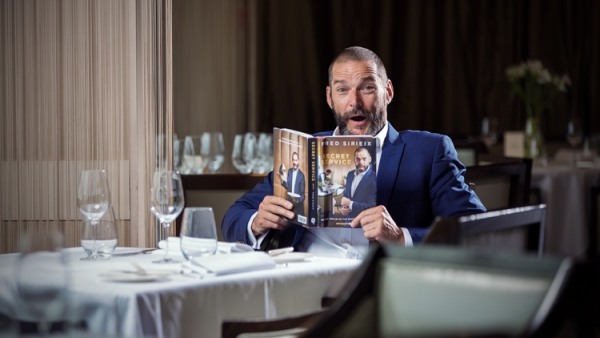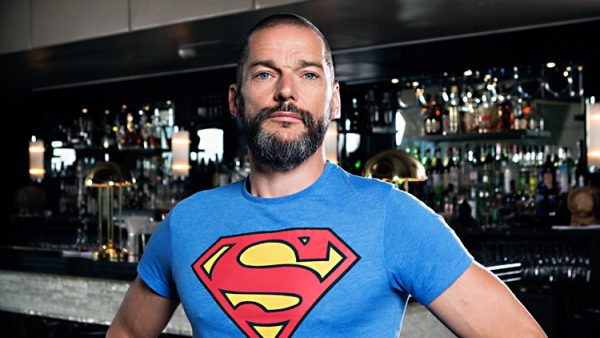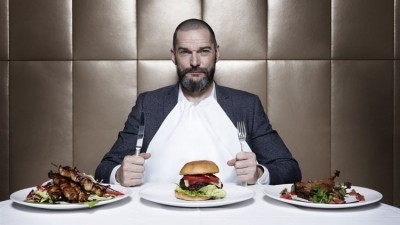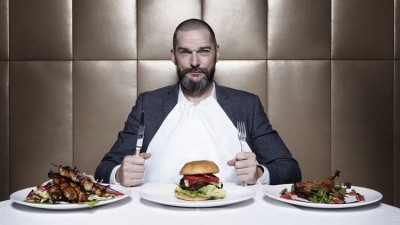Super Fred: The masterful maître'd on First Dates, Brexit and tipping

Fred Sirieix is discussing military tactics. The Frenchman has read The Art of War, the Chinese treatise on warfare, multiple times since his 20s and believes its lessons can be applied to restaurant service.
His approach is less about smoothing tablecloths as customers enter, and more about being prepared for anything. He likens the ‘front-line’ restaurant staff to ‘gazelles on Red Bull’. The lion, a polite term for a difficult customer, could come at any moment, and they must be ready.
“I always notice everything, I need to because I’m always learning,” he says. “We do 5,000 to 6,000 covers a month here; you can’t take it for granted that everything will go well.”
It’s mid-morning when we meet at Galvin at Windows, the 28th floor restaurant overlooking Hyde Park where Sirieix is general manager. The 45-year-old has been up since 7am and has already fitted in a gym session, photo shoot and a 30-minute bike ride to work. With a large, greying beard, steely blue eyes and mischievous grin, Sirieix is a bounding ball of energy at the peak of fitness – as well as a cyclist he is a proficient boxer and all-round fitness freak – and he cuts a dash on the restaurant floor that understandably caught the eyes of the television producers. Around us, a team of equally immaculately dressed staff are prepping for lunch service while the ebullient GM keeps an eagle eye on proceedings.
“You need to be fit in this work,” says Sirieix, whose 25 years working in the UK has done little to subdue his Gallic burr. “It’s about keeping your finger on the pulse. I’m always scared about what I haven’t done. I’ve got that constant paranoia of not having done something or done enough.”
It’s this relentless work ethic and attention to detail that has helped him become the UK’s most high-profile front-of-house operator. Brought up in the south-west central city of Limoges, Sirieix initially trained as a chef but switched to the dining room after he misjudged a pasta recipe and ended up covering his parents’ kitchen with strings of tagliatelle.
After arriving in London in 1992, aged 20, he took a job at La Tante Claire under Pierre ‘the bear’ Koffmann, and went on to work at Le Gavroche, Sartoria and Bluebird Café. In 2006, he received a call from chef Chris Galvin, who was one month away from opening Galvin at Windows, and needed a general manager. Sirieix took the job while still serving out his notice period at Mayfair’s Kilo, and would race between the two to run service at one while dealing with errant builders and suppliers at the other.
He has barely slowed down ever since. From the launch of Galvin at Windows, Sirieix has helped the restaurant win a Michelin star, pioneered several industry training schemes, become one of the hospitality industry’s most prolific fundraisers and kick started a television career that has seen him work with Michel Roux to promote front-of-house careers and help singletons find love on Channel 4’s First Dates.
Now he is preparing to release his second book, Secret Service: Lifting the lid on the restaurant world, delving into his experiences of the industry. “I need to be active, my brain works at 100 miles an hour, there’s always a new idea and need to do something else,” he says. “My days are fast, but I like it like that – I don’t know any other way.”
A tipping point for British gastronomy
Sirieix describes the early ’90s when he arrived in the UK as a tipping point for British gastronomy. His fellow Frenchmen Koffmann and Albert and Michel Roux had crossed the Channel and entered the Michelin Guide with their restaurants La Tante Claire and Le Gavroche, and he says they were the only places he wanted to work when he arrived.
But despite his fine-dining pedigree, he feels the UK restaurant scene’s more recent shift away from formality has been for the better.
“When Albert Roux arrived in England in the 1960s he described it as a culinary desert,” he says. “But the English have a capacity to adapt and try new things. You don’t see it in France or Italy. People are more stuck in their ways.”
He rejects the term ‘casualisation’ and instead insists the rise of informal restaurants has been brought about by a shift to a more authentic style of service.
“It’s about taking the pretension out of fine dining,” he says. “When you talk about bad service, you talk about a lack of human connection. I’ve worked with people who would come into the restaurant and put on a posh accent because they thought that’s what guests wanted, but it’s not. Customers want you to be genuine and attentive; whether you’re a rock star or a plumber, we all respond to the same stimuli. So it’s not about casualisation but finding a new, more genuine way to make service professional.”
Without naming names, he is equally dismissive of chefs who set out to cook for Michelin inspectors before they’ve even opened the doors. “We cook for the public. Michelin is a customer. It’s nice to win a Michelin star, but who would want to cook for a guide? It would be complete suicide.”
The pains of Brexit
Home to Sirieix is no longer France but Peckham, south London. Like many in the hospitality industry who came to the UK from overseas, he met last year’s Brexit vote with disbelief.
“I’ve been here 25 years and have been made to feel so welcome,” says Sirieix. “On 23 June after the Brexit vote, the first thing my daughter said to me was ‘papa do we have to leave?’. The truth comes out of children’s mouths. You have three million people from the EU living in this county and that’s how they feel.”
In July, when the Prime Minister announced an offer of granting ‘settled status’ to EU citizens who have lived in the country for five years, Sirieix took to Instagram with a video of him dropping a mocked-up ‘settled’ badge in the toilet. He likens the aftermath of the vote to going through a divorce. “It’s like being with somebody for years and then them turning round and saying ‘I don’t want to be with you anymore’,” he says. “It’s completely crazy. There is a wind of folly that’s blowing through the world. I won’t go back to France. I love England and it’s where I’ve made my home.”
His concerns over the referendum are not just personal. Earlier this year, a KPMG study commissioned by the British Hospitality Association (BHA) estimated that 75% of UK waiters and waitresses, 25% of chefs and 37% of housekeeping staff are from other countries in the EU. The research warned that if restrictions are placed on EU migration, the industry will need to find 60,000 replacement workers per year, in addition to the 200,000 staff currently required to plug the gap caused by staff churn.
“It used to be very attractive to work in the UK. Now there is a perceived antagonism towards foreigners. Brexit won’t be Armageddon but the industry will suffer.”
Tackling the skills shortage has become something of a mission for Sirieix over the past few years. The UK’s problems, he believes, run deeper than an over-reliance on foreign workers to run the nation’s restaurants, hotels and pubs, and that the missing link lies in its catering colleges.
The fastidious Frenchman comes across as someone who has little patience for those who don’t share his high standards, and when the topic turns to the education system, he is incredulous. “I’m sorry, but there are nearly 300 catering colleges in this country, where do their students go? It’s nuts because Galvin at Windows is on television and we have a good reputation but we still get very few calls from colleges and lecturers. Where are these students? Why aren’t they queuing out of the door here?”
He adds that this perceived failure of the culinary education system to produce dedicated staff is putting an extra layer of pressure on hospitality businesses. Five out of the 60-strong team at Galvin at Windows are British, and the restaurant has had to extend its own in-house training in order to meet the shortfall.
“We have to be both a business and a school,” he says, shaking his head. “We can’t find any staff who are British, so we hire foreigners who sometimes don’t know the language or the job that well. So we’ve got to teach them English as well as the job.”
Plugging the skills gap
In 2009, Sirieix and chef Chris Galvin launched Galvin’s Chance, a hospitality training scheme for young people not in education or employment. He is also behind The Right Course, a programme that aims to transform inmate-run restaurants in prisons in to high street-like operations, and National Waiters’ Day, a celebration of front-of-house staff that – inevitably, given his athleticism – involves some sort of fitness.
Though he admits the ideas are not about to single-handedly solve the skills crisis, he believes they offer a vision for trainees that is lacking in UK catering education. While such schemes are rightly raising the profile of front-of-house careers, how far can they address the public perception that hospitality work is both underpaid and undesirable? For this, he suggests a rethink of another thorny industry issue: tipping.
Service charge in the UK has been taxed since 1992, and government has dithered on any further legislation around the issue. Sirieix believes politicians need to rethink how service charges work. In his new book he spells out his vision, writing: “There should be a system whereby we have a service charge that is entirely tax-free income for the restaurant staff. It would not be discretionary, but a compulsory charge, rather like VAT or indeed the cost of the meal itself.”
He believes such an approach would save restaurant owners money, and staff would have higher wages and, therefore, do a better job. This would, in turn, address the skills crisis by boosting the reputation of the profession.
“If we had that tax incentive from the Government then waiters’ salaries would go up and people would want to join the industry for that benefit. People would say it’s not fair for other sectors, but it’s not a question of fairness, it’s about what is right. What is right is that hospitality is the sixth biggest industry yet we need more staff. It’s an important industry because it markets the country to visitors.”
He adds that he is frustrated at the ‘total hypocrisy’ on all sides of the debate, and doubts the industry’s ability to bring about any real change over the issue.
“People have these grand ideas about fairness but if restaurants scrapped service charge and put the prices up they wouldn’t go out to eat as much, and who will suffer then? It will be the waiters, the chefs and the managers. When it comes to it, they don’t want to part with their cash. So that’s hypocrisy for me. There is too much of a division in the industry, we don’t have one voice. Are we able to put pressure on the Government to get what we need? I don’t think so.”
The nation’s maître d’
Sirieix acknowledges that his on-screen work in First Dates has allowed him to raise the profile of his industry causes. Since 2014, he’s acted as the nation’s maître d’, consoling nervous singletons as they meet for the first time in front of the cameras.
In 2016, First Dates won a BAFTA, further propelling Sirieix into the limelight and leading to appearances on programmes such as Alan Carr: Chatty Man. While numerous chefs enjoy such celebrity status these days, he is the only person from the front-of-house side of the restaurant industry to have crossed into this territory.
While he enjoys the show and its “genuinely nice” premise, he insists that the role of television personality is not an easy fit. “It makes me laugh because I don’t feel like a ‘celebrity’,” he says. “I’m a waiter, and will always be a waiter.” Despite his reluctant star status, he admits the show has begun to impact his life off-screen. Visitors to Galvin at Windows now request selfies, and he is even recognised on his daily 30-minute commute to work.
“The other day I was cycling and four cops on bikes went past me and shouted ‘hey Fred!’. I don’t think anything can prepare you for that,” he says. “You just have to deal with it and try and make sure people are happy when they meet you. I’m also learning to say no to people if I’m on holiday or in a rush,” he grins. “Sometimes I’m tired!”
Sirieix is hopeful he can use his TV profile to continue to promote National Waiters’ Day, the industry event he founded in 2013 that aims to champion front-of-house careers. What started out as a small event in Canning Town has grown to a nationwide initiative run in partnership with The Springboard Charity. This year, more than 300 waiters and waitresses, the largest number to date, balanced their trays for the 150m race in Hyde Park and his ambition for the project is even bigger. He hopes to eventually close down The Mall and start the race from Buckingham Palace, with one of the Royals firing the starting gun. “It’s a long shot but if you can dream it, you can do it,” he says.
Despite his considerable achievements, the First Dates star and front-of-house champion is showing no sign of slowing down. He prefers to work in collaboration with others and says he receives lots of calls and opportunities for new projects, and would “possibly” consider launching his own restaurant in future. But with so many plates spinning in the air, how does this service supremo manage to prevent it all from crashing down?
“Conditioning your body is as important as conditioning your mind,” he says. “I’m 45 and this morning I was training and my body was telling me to stop. But if I stop, I let myself go. I will let myself go when I’m dead. There’s a guy on one shoulder telling you to give up and crawl into a ball and another saying, come on! The key is to let that guy win.”
Secret Service: Lifting the lid on the restaurant world by Fred Sirieix is published by Quadrille on 19 October, £16.99.
This is a web version of an article that first appeared in the September issue of Restaurant magazine, the leading title for the UK's restaurant industry. For more features, comment, interviews and in-depth analysis of the restaurant sector subscribe to Restaurant magazine here.

























